Acts 3:1-10
This sequel to Luke’s Gospel, is often called, “The Acts of the Apostles”, but it would be better named, “The Acts of the Spirit.” The Spirit is the active agent throughout. We celebrated Pentecost last week when the Holy Spirit came in a powerful way upon the disciples. We were left with that beautiful cosy post-Pentecost picture of the community living, eating, praying, and worshipping together, sharing everything in common. Wouldn’t it be nice if the Spirit just left us to that quaint picture of chummy inversion, an egalitarian community living in isolation away from the suffering and injustices of the world? But no – that is not what the Kingdom of God is like. The Spirit doesn’t leave the disciples there, the Spirit refuses to let her church become an insular social club. The Spirit refuses to let her Church slide into a one-day-a-week Sunday religion which separates material existence from the spiritual and erects rituals and practices of self-seeking, self-satisfying, other-worldly piousness instead of practical works of righteousness.
One voice I could not get out of my head this week is that of Christoph Blumhardt, the 19th century German Pastor and Theologian who wrote, “The Kingdom of God is taking on colossal dimensions ... We have to come out of our little rooms, out of our isolation. The kingdom comes into the streets, where the poorest live, the outcasts, the miserable. There the kingdom of God comes. It extends into the heavens and into hell, and to all peoples.” This is what’s happening in our passage this week. So, it’s not long before the Spirit pushes the disciples out from their comfy confines to confront the real world. The Spirit is indeed the comforter, and the advocate, but she is also the one that hurls us out into the stark reality of the world. When the Spirit descended at Jesus’ baptism in the Jordan River, the very next thing the Spirit does is thrust the Messiah out into the cruel arid environs of the wilderness. The same is happening here.
There’s an old hymn that goes, “Sweet hour of prayer, Sweet hour of prayer, that draws me from a world of care…”, it’s true that the church should be a haven, a spiritual sanctuary of sorts, but that’s not the only picture presented to us here in Acts. The hymn would be more accurate if the words were “Sweet hour of prayer, that draws me into a world of care.” Peter and John are heading to the Temple to praise God at the hour of prayer, probably around 3pm. It would have been hot, dusty, sweaty, and crowded… and there at the edges of the crowd lies a man, we are told lame from birth, wounded from the womb. We are afforded no reason for his plight, no neat cause and effect thinking about why this man was disabled, as if his suffering was a result of some sin. Luke offers no explanation here. All that matters is the meeting. The path to prayer for Peter and John, is a path through human misery, not around it.
We have already been told how the disciples went to pray in the Temple daily. After all, Peter and John were good devout Jews – the term “Christian” didn’t yet exist, the Church as a distinct entity from the synagogue just wasn’t a thing. The Church is a diversification of Israel. We would do well to remember that Jesus didn’t come to create a new religion, the Church is not Plan-B after a failed covenant with God’s Plan-A, the people of Israel. No, it might not always look like it today, but we gentiles have been grafted into their story which has been fulfilled in the one true and faithful Israelite, Jesus. So, the Disciples were making their way to the Temple to pray daily, and this man was laid at the large bronze Temple gates, daily. This means that the Disciples would have already walked past this man many times, it’s quite likely that Jesus Himself walked past this man too. So, what’s different about this journey to the temple? Why stop this time?
Willie James Jennings says this:
At the doorway to worship [the Temple] are those whose very presence should discipline praise and guide hope. Before praises go up to God the poor and lame, sick and pained must be seen. This lame man lay in the path toward praise which is also the path of the disciples. This route was established by Jesus. This man is precisely the person Jesus will see and demands his disciples see. Peter and John find themselves without an option: time to see with the eyes of Jesus.
I have the privilege of being part of the Beta Group at HTH, meeting on Wednesdays with a few folks who have only just begun their journey following Jesus. Gemma, who came and shared her testimony of how Jesus found her a few weeks back is in this group, and she said something that really struck me, reflecting on what life was like since beginning to follow Jesus she said, “I feel awake.” She said she has begun to notice and interact with people who before were invisible – that person experiencing homelessness, that old man you see everyday who always looks sad and lonely. I think what Gemma is experiencing, and what many of us seasoned Christians may well have forgotten is what Christoph Blumhardt, calls the “double conversion”; first, we are converted to God, second, we are converted from God to the world. I wonder how many of us are stuck on the first? When Jesus finds us, and our eyes are opened to the truth, they are also opened to see the world with the eyes of faith. That’s what’s different here with Peter and John, it’s what the post-Pentecost people of God now see, they now see what was previously invisible. The Spirit has come and now they see what the Spirit wants them to see, what Jesus wants them to see. Now they see with the eyes of Jesus. The man who they had ignored so many times before is now burnt into their retinas.
Peter and John stop and look intently at Him. Most people probably wouldn’t have made eye contact for fear of giving the man some false hope that someone actually cared about Him enough to give him their time and attention. They would have thrown their coins at his feet before swiftly shuffling on to practice their piety in the Temple. Not only that but they demand that he look at them. Again, as Willie Jennings observes,
Disciples are watched, especially by those in need.
Disciples must be seen, especially by those in need.
What we see, and who we are seen by, is of immense importance. Now through this intense gaze, they are bound to one another. The moment they lock eyes the Spirit has obligated Peter with a responsibility to care for this man as though, in accordance with the Law of Moses, he was a foreigner, or an orphan, or a widow in the land. We can recall two things here also. Peter is the one who denied Jesus, and Jesus promised that whatever you do to the least of my sisters and brothers, you do it to Him. Peter is restored by Jesus, and instructed to feed his flock. Here is this man, one of the least… will Peter deny Christ again? Will Peter feed Jesus’ sheep? Peter stops, because the Spirit is doing a work in him.
The Spirit is freeing Peter from the allure of apathy and giving him the gift of attention.
St Maximillian Kolbe was a Polish Catholic Priest and Franciscan Friar. When Poland was invaded and occupied by the Nazi's in 1939, Kolbe refused to sign Heinrich Himmler’s Deutsch Volksliste. The Volksliste a afforded ethnic Germans like Kolbe a greater degree of rights, securities, and privileges. Kolbe not only refused to sign up, making himself vulnerable, but he then went on to harbour some 2000 Jewish refugees at his friary in Poland, and published scores of anti-Nazi publications from the Friary Printing house. In 1941 the Gestapo shutdown the friary, arrested Kolbe and shipped him to Auschwitz. Later that year, when a prisoner escaped the camp, the deputy camp-commander, Karl Fritzch, attempted to deter further escape attempts by picking 10 men to be taken and starved to death in an underground bunker. When one of the chosen 10, Franciszek Gajowniczek, cried out lamenting the fate of his wife and children, Maximillian Kolbe volunteered to take his place. The switch was permitted, and Kolbe was imprisoned in the starvation bunker. After two weeks, all but three of the men had died. Among the 3 was Kolbe. When officers needed to make room in the bunker for the next batch of starvation victims, Kolbe was given a poisonous injection of carbolic acid. Before he died, Kolbe penned the words,
“The most deadly poison of our time is indifference.”
Indifference, apathy, is a vice, a deadly Sin, but it’s so much easier to swallow even as its sweet poison kills us. The much harder road, the difficult path of attentiveness to others, especially the suffering and powerless, is a God-given virtue we must battle to keep a hold of. The Spirit-filled and Spirit-led people of God cannot be followers of Jesus and remain indifferent to the suffering of the weak and powerless.
Having given this man his attention, Peter extends to him a gift. His gift is a powerful one, but not of the kind that “the powerful” give, Peter has no coins bearing Ceasar’s image. The only gift Peter has is the gift of God to the world, the one bearing God’s image, Jesus Christ. God’s only currency is Christ.
The Spirit had freed Peter from the temptation to be powerful, instead giving Him power for the powerless in the name of Jesus.
In the year 1210AD, Francesco di Pietro di Bernadone was summoned to the Vatican by Pope Innocent III. When people are summoned by the Pope, it’s not usually good news. Francesco had been causing a bit of in his town in central Italy. Just as the church was amassing wealth and power, Francesco and his brothers in Christ were amassing the poor and powerless. Francesco had taken a vow of poverty, to live as Jesus did, with “nowhere to lay his head”, dependent on the goodwill of others. He defiantly didn’t even wear shoes. Francesco’s church was a poor church where shepherds would bring their sheep to services with them, a church where foreigners, widows, and orphans were welcomed, fed, and given the best seats in the house. The nearby townsfolk were leaving their wealthy church and redirecting their finances to Francesco’s church where it was distributed to homeless immigrants, widows, and orphans. So, the "Poor Boy Francesco", as he was known at the time, was called to Rome to be publicly chastised for drawing people (and money) away from the institutional church. But the story goes, that it was the Pope who was the one chastised. Upon arriving in Rome, Pope Innocent showed Francesco the coffers of the Church, overflowing with riches, and he boasted, “We no longer have to say with St Peter, 'Silver and Gold I do not have.'” Francesco, who would later come to be known as Saint Francis of Assisi (the one who founded the religious order that Maximilian Kolbe belonged to 750 years later), replied, “Then neither can you say, 'In the name of Jesus Christ of Nazareth, get up and walk.'”
The lame man expected the gift of money, and he received the gift of Christ. Both gifts carry power, and both lead to worship. Money grants us power, but it also demands our praise. The power that money grants us is a power over other people, it draws a line between the “haves” and the “have-nots.” Money grants us the kind of power over people that seduces us to violence, the kind that enslaves people and crucifies innocents. But the gift that God gives, the gift of Jesus Christ, grants us a power not over others, but a power for others, for the “have-nots” and the powerless. If we worship Jesus because we think He grants us power over other people, then the Jesus we’re worshipping is an idol made in Ceasar’s image. The power Jesus gifts is always power in the service of the powerless.
So, the Spirit was at work in Peter destroying apathy and making him attentive to things formerly invisible. The Spirit was freeing him from the allure of power to give to those who have none.
And the Spirit was freeing Peter from a prison of idleness and releasing him into action.
In 1738, at a worship service in Philadelphia, a minister was in the middle of giving a sermon when he was interrupted by a man dressed in a military uniform. By virtue of a growth hormone deficiency and a crippling case of kyphosis the man stood at barely over 4 foot tall with arms as long as his legs. The hobbit-sized agitator was Benjamin Lay, an Englishman who had travelled the world as a Sailor before settling in the United States where he had developed a reputation for incivility and dissent. Lay – who later in life would become a cave-dwelling vegetarian hermit who made his own clothes and ate only acorns and peaches – would regularly start arguments with preachers in the middle of their sermons. His church back home in London, wrote letters to churches in America, warning them of Lay's "indiscrete zeal." For Lay was a staunch abolitionist and activist who simply could not tolerate or turn a blind eye to the profound hypocrisy of Christians owning slaves – this flew in the face of what he read about the disciples in Acts. That fateful evening in Philadelphia, Benjamin Lay stood on a pew in the middle of the service declaring that God loved all people equally, regardless of how sinners sought to interpret the scriptures. And then taking a Bible in one hand, and a dagger in another, he plunged the blade into the book splattering fake blood over all those nearby and proclaiming, “Thus shall God shed the blood of those persons who discriminate against their fellow creatures.”
Apathy, power, and idleness would prevent us from action. To be the Church, is to be a people of action, a people who are led by the Spirit away from the simple path of apathy, out of the alluring grip of power, and into action. God doesn’t call us to Him for us to then sit around twiddling our thumbs waiting for Jesus to return. God calls us to wait yes, but also to work with Him for the good of the world.
The same Spirit that moved Peter, and Maximillian Kolbe, and St Francis of Assisi, and Benjamin Lay, is the same spirit that is here with us, right here and now, in this moment today. This Spirit of Christ is in you, advocating for you, comforting you, forming you, and calling you out of yourself and into the world she loves, into the world that needs to know the love of this weird and wonderful God who doesn’t just give more than we could ask for, but always gives better than we could ask for. The question for us today then is,
How are you going to respond to what the Spirit is doing in you?
What will you do with the gifts that the Spirit has given you?
Will you leave here today and let them gather dust?
Or will you leave here today and put them to use?
Because as Christoph Blumhardt put it,
“We have seen enough of what the devil can do. Let us now see the power of the Lord Jesus.”
Amen.





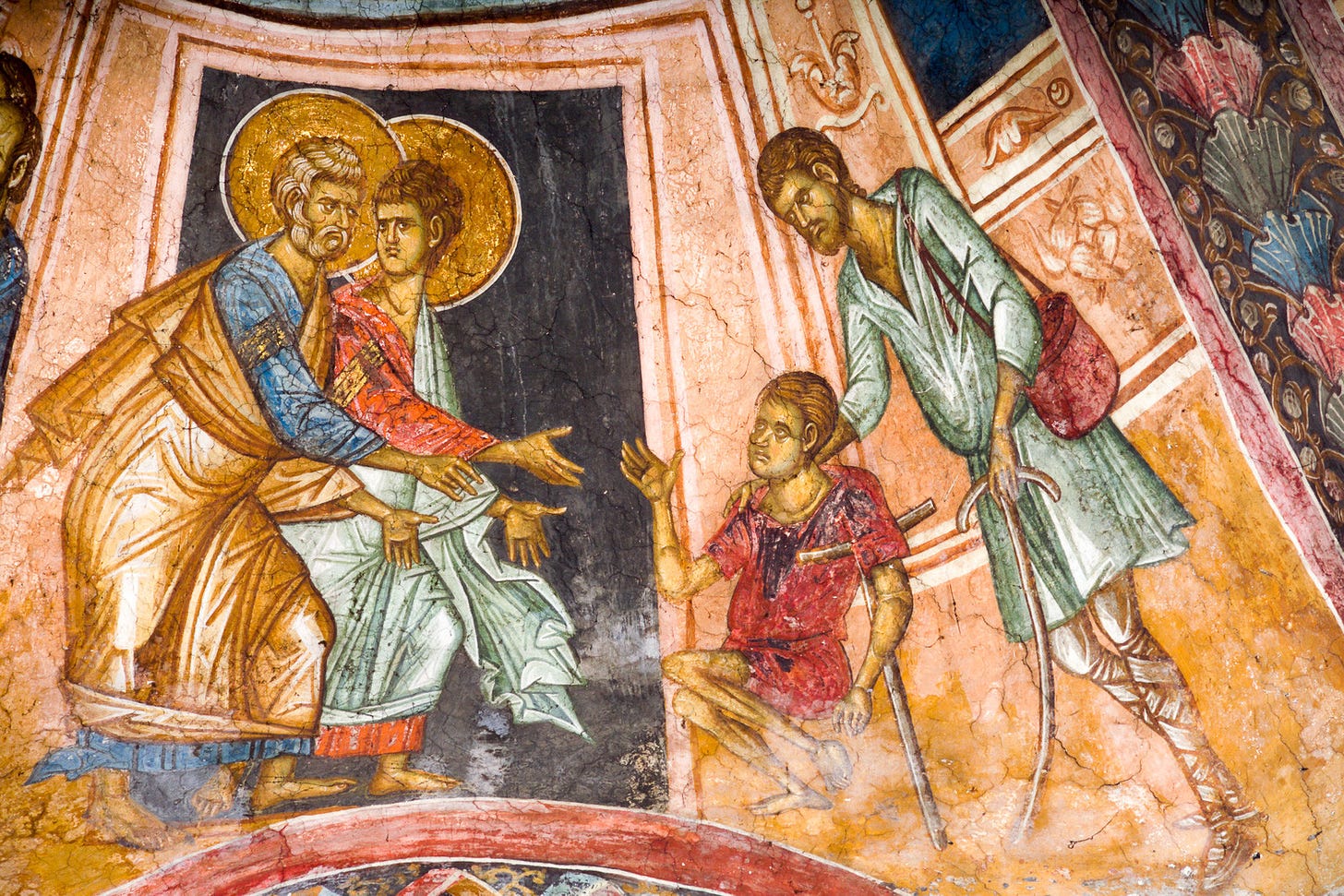

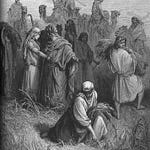
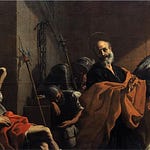
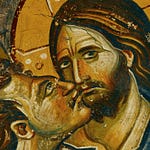
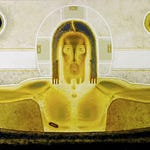
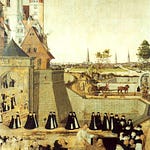
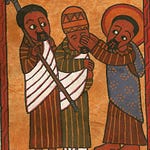
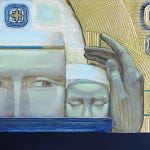
God's only currency